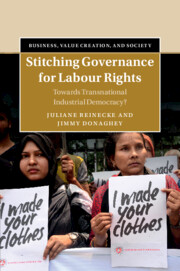Book contents
- Stitching Governance for Labour Rights
- Business, Value Creation, and Society
- Stitching Governance for Labour Rights
- Copyright page
- Contents
- Figures and Tables
- Foreword
- Foreword
- Acknowledgements
- Abbreviations
- 1 Introduction
- 2 The Democratic Deficit of Global Supply Chains
- 3 Democratic Representation
- 4 After Rana Plaza
- 5 Representative Alliances in the Creation of the Bangladesh Accord
- 6 Creating Representation through Industrial Democracy versus CSR
- 7 When Transnational Governance Meets National Actors
- 8 Building Representative Structures at the Workplace Level
- 9 Conclusion
- Book part
- References
- Index
8 - Building Representative Structures at the Workplace Level
Published online by Cambridge University Press: 09 March 2023
- Stitching Governance for Labour Rights
- Business, Value Creation, and Society
- Stitching Governance for Labour Rights
- Copyright page
- Contents
- Figures and Tables
- Foreword
- Foreword
- Acknowledgements
- Abbreviations
- 1 Introduction
- 2 The Democratic Deficit of Global Supply Chains
- 3 Democratic Representation
- 4 After Rana Plaza
- 5 Representative Alliances in the Creation of the Bangladesh Accord
- 6 Creating Representation through Industrial Democracy versus CSR
- 7 When Transnational Governance Meets National Actors
- 8 Building Representative Structures at the Workplace Level
- 9 Conclusion
- Book part
- References
- Index
Summary
While much attention has been paid to creating deliberative and representational institutions at the transnational level, little focus has been placed on the creation of representative structures at the workplace level. Chapter 8 explores mechanisms of developing transnational industrial democracy at the workplace level. Efforts aimed at promoting worker representation such as the creation of democratically elected occupational safety and health committees under the Accord. We focus in particular on the workplace social dialogue programme by the Joint Ethical Trading Initiatives (JETI). Workplace social dialogue provides a potentially promising mechanism for enabling worker voice in a context of toxic industrial relations. We examine the enabling roles which brand played in developing dialogue at their supplier factories but also unveil the resultant tensions their involvement exposed in their relationship to factories and workers.
Keywords
- Type
- Chapter
- Information
- Stitching Governance for Labour RightsTowards Transnational Industrial Democracy?, pp. 173 - 192Publisher: Cambridge University PressPrint publication year: 2023

